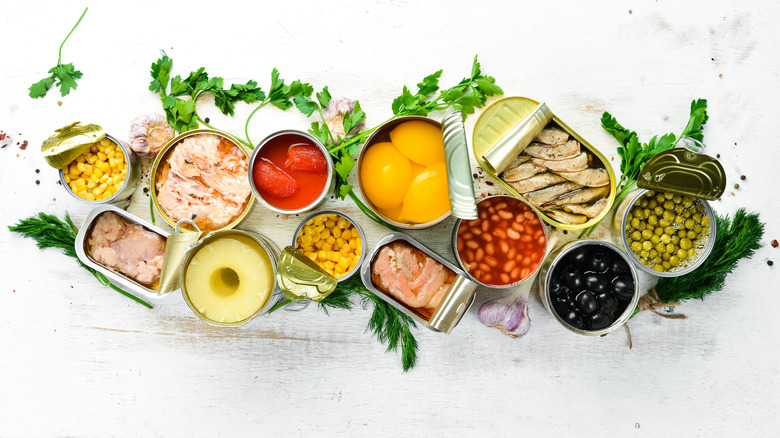Does Canned Food Contain Less Vitamins Than Fresh?
Most kitchen pantries contain a handful of canned foods that are purchased "just in case." They're often hiding in the back collecting dust and may be ticking well past their best-by date. Canned foods are a convenient, cost-effective, and shelf-stable option to have on hand. Yet there are probably only a few people whose first choice for dinner would be canned when fresh food is an option.
In 1795, the French government put out a request in search of a means to preserve food for the army and navy soldiers away at battle. In response, a candymaker perfected the canning process and published the new method by 1810 (via History). So, if you're not in a bunker and have access to fresh produce, is there any reason to forage through your cabinet and whip out your can opener? Should you toss out those dusty cans and stick to the grocery store perimeter? Or, at the very least, can you feel confident about your health when stocking up on canned goods?
A few factors at play
Nutritional value comes down to what's in the can. Some nutrient loss may occur in canned foods that contain vitamins B and C. A 2007 study published in the Journal of Science and Food Agriculture found that the high heat used during the canning process may damage water-soluble vitamins. On the other hand, a 2013 study published in the same journal found that the nutritional composition of canned peaches is comparable to fresh.
When done properly, canned foods may be more nutritious than fresh. Per the United States Department of Agriculture (USDA), vitamin loss in produce begins as soon as the crop is picked. If not preserved correctly, as much as half of the nutrients may be lost. If canned immediately, this loss is mitigated. Also worth considering is what's on the ingredient label. Inside Tracker points out that canned soups are usually high in sodium or other preservatives. Many canned fruits come packed in sugary syrups (via the American Diabetes Association). However, foods packed in water or their own juices are often comparable to their fresh counterparts.
Canned foods are a handy, affordable, long-lasting, and even a nutritious option. They also serve as an excellent way to get more vegetables, fruit, and clean protein into your diet. A study published in 2015 in Nutrients concluded that those who consume canned foods frequently have a more nutrient-dense diet and overall healthier eating habits. Give those canned guys a spot at the front of the pantry.

